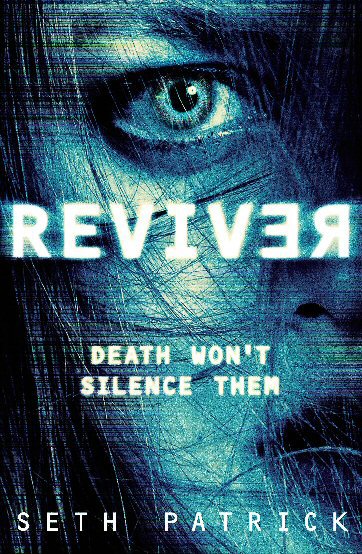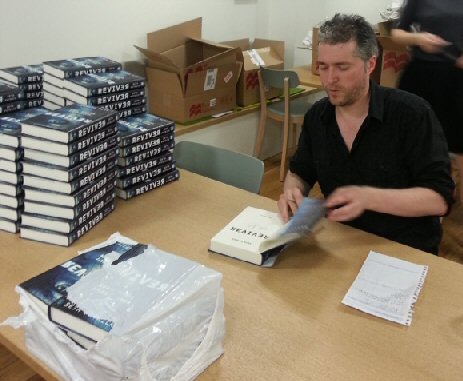Oxford mathematics graduate and Total War games programmer Seth Patrick has just published the first volume of his horror trilogy REVIVER (by Pan Macmillan in the UK and Thomas Dunne Books in the US). Early reaction to the first book has been impressive with Legendary Entertainment (producers of Dark Knight Rises and Man of Steel) optioning the movie rights already and reviews widely glowing. Join SGM’s very own horror literary librarian Tracey Katz as she takes time out to collect her thoughts on REVIVER then kick back to discuss the book with author Seth Patrick…

Tracey: Hi Seth. As you might have gathered from my review, I really enjoyed reading Reviver. It’s an extremely accomplished first novel. Does it feel like life is a series of ‘Somebody pinch me in case this is a dream’ moments just now?
Seth: Absolutely, it’s been very strange from the moment I got an agent. And then, the novel was sold as part of a trilogy. And then, the movie rights went to the producers of Dark Knight Rises and Man of Steel. Now, the book’s out there, and getting great reviews, and people are already looking forward to book 2. I’ve not quite got my head around it yet.
Tracey: Reviver was born from a germ of an idea you had, which was brought to light during your attendance at a creative writing course with Peter James almost a decade ago. As Peter James was then better known for his horror fiction, did this lead you to envisage Reviver as purely a horror novel?
Seth: Reviver was definitely a horror novel from the start. The writing course was titled ‘Writing Scary Stories’, but this was exactly when Peter James was transitioning to crime fiction, with his first crime book released a few months later, and his change in emphasis was clear in the brief he gave us for our first bit of homework: write the first page of a scary novel, introducing your protagonist and a murder weapon. That’s pretty clearly horror/crime from the off, but for me the horror part was always at the fore.
Tracey: I think that Reviver is difficult to pigeonhole and it does frustrate me that only books seen as worthy or mainstream tend to earn plaudits from the popular press. I stand by my comments that Reviver and its sequels will be a mainstream hit. Did you set out to cross genres and smash barriers or was Reviver simply the manifestation of a damn good idea, written well?

Seth: Like you, I find the press approach to genre fiction frustrating. The only things that get much attention are worthy, ‘improving’ books, and already-huge hits. There’s so much great stuff that really just gets ignored unless it breaks through.
It’s a shame, because there are plenty of people out there wanting to read books if they’re confident they’ll enjoy them, as the vast success of Fifty Shades made clear.
The press focusing on works that are less accessible just means that lapsed readers will take a punt on something they’ve been told is exceptional, but come away underwhelmed and in no hurry to read anything else.
Meanwhile there are self-published ebook authors who are almost unheard-of, but earn more than most physically-published authors because they’ve found an audience who love their work. The potential market is enormous, if we can just ditch the notion that reading is primarily some kind of self-improvement chore.
Back to topic, though! The genre mash-up came with the crime/horror blend of the premise, but I certainly put fuel on the mash-up fire. One of the big early choices was whether to keep the idea small-scale, or to really go for it. Small scale would allow a long-term series of reviver-led crime procedurals, and would probably have more reliable appeal to crime fans, but it wasn’t what I wanted to do. I’m always going to write the kind of thing I’d want to read, and for me that means something accessible and entertaining, with a huge bias towards horror and SFF. So, the crime/horror in Reviver gives way to horror/SF, because that’s what I would damn well want to read!
It’s a risk, I guess – a gamble that there are people out there who enjoy what I enjoy. As long as it pays off enough for me to write full time, I’m happy.
Tracey: Jonah Miller is a very complex character, dealing with issues that we can’t begin to imagine; the isolation of being a Reviver, the knowledge that physical contact can bring ‘chill’ to anyone who touches him. How hard was it to get into the head of such a person? Was the character of Never brought in to balance Jonah? A sort of kawaii emo foil to Jonah’s soul searching Goth?!
Seth: I’m not exactly an extrovert now, but when I was a kid I was a real loner. Jonah is just an extreme version of that, I think – made so much worse because he has every reason to feel that way.
There was no single moment of inspiration when I realised it needed a character like Never to balance things. Jonah spent much of the earliest Never-free draft isolated. From the moment Never’s character appeared and took on the role he did, things just clicked. Suddenly someone was there who could say ‘Stop being so fucking miserable’ to Jonah, and actually get a smile from him. It made me feel much better knowing somebody was looking out for the guy.
Tracey: I know that Poe was a huge influence for you, but I see hints of Lovecraft’s ‘Great Old Ones’ in some of the visions of the watchers in the dark. Will we see a development of a mythos surrounding these beings in future Jonah Miller novels?
Seth: Lovecraft was very much an influence, yes. Early drafts took a far more vague position on what was facing Jonah and the others, but I couldn’t resist expanding on it. Books 2 and 3 develop things a little; how far remains to be finalised, but the events of Book 3 are such that, again, I might not be able to resist.
Tracey: There is a lot of gore in Reviver, but it’s not lavish or overindulged in. As Jonah is very respectful of the dead, was it a conscious decision to use his ‘voice’ to describe the murder victims and thus avoid sensationalising any of the deaths?
Seth: The descriptions were intended to feel clinical – and as you point out, respectful – along with a matter-of-factness that I wanted to bring to the whole revival process, at least from Jonah’s perspective. My hope was that I could make the FRS feel as real as possible for the reader, lure them in to this entirely unreal world and let it seep into their bones for a while.

Tracey: You are a games programmer and father by day and potential literary giant by night. As this is far removed from your imaginary world, what sort of research did you engage in for Reviver? And as an Irishman in England, why relocate the action to the US? (Any amusing autopsy attendance anecdotes will be gratefully received by SexGoreMutants readers, should you wish to share)
Seth: I had to read plenty of crime fiction, something I’d never really done before, and I went back to Lovecraft and Poe, but the most disturbing research was immersing myself in forensic pathology books. Some people I showed this stuff to were entirely unfazed by it, but it really got to me. Then, I noticed I was getting used to it. Really brutal injuries, horrible mutilations and severe decomposition had become fascinating rather than repellent.
I had no urge to kill small animals, though.
The earlier drafts were all set in England, with the FRS headquarters in Croydon – another part of the desire to make the world of revival feel down-to-earth, setting it somewhere mundane. The US relocation happened for two reasons: first, my agent was naturally keen on the idea, and second, my early readers were telling me the UK setting was jarring, that the action had a very American feel to it. In the end, when I opted to relocate I hardly had to change anything. It was mainly about selecting locations and getting travel timings to work.
I think the writing was very visual, very movie-like, and the American setting just suited that better.
Tracey: Reviver has great pace, three-dimensional characters and a hell of a good tale at its core. As it’s your first novel, I can only ask, how did you pull that one off?
Seth: It took a while, and I had help! I started it in 2004, and maybe went through six drafts before I approached an agent in 2011. He helped me knock what I had into much better shape, and then once the book sold, my editor at Pan Macmillan zeroed in on the weaknesses. We worked hard to fix them, and without her the book wouldn’t be anywhere near as good as it is.
Tracey: The film rights to Reviver have already been sold. Given free reign and a limitless budget, who would you cast in the film version? And who would direct?
Seth: Tough question. I think the principals would be better as relative unknowns, so as long as the casting agent could, um, find three or four rising stars of immense talent we’d be fine. There are a few juicy roles on the periphery that could work well with established faces – Sam, Tess, Andreas and Barlow, say, but I didn’t cast them as I was writing the book and I can’t seem to do it now, either.
When people ask about who I’d like to direct I get them to fire off suggestions. Invariably, I shake my head because I remember their misfires, but the one director I’ve found myself nodding about is Alfonso Cuaron, because of how real Children of Men felt. Bottom line, though, I would want someone who loved the book and wanted to stay as faithful as they could, but where changes are needed make them for the better.
Tracey: And finally; can you give us a hint as to what comes next for Jonah Miller?
Seth: As I’ve already hinted, the trilogy won’t just be a simple crime series. In book two, things change in a big way for Jonah, and not for the better.
To be honest, I’m kinda worried for him…
Tracey: Thanks for your time and your answers, Seth. I’m looking forward to finding out what kind of bad Jonah can get himself tangled up in next.
REVIVER by Seth Patrick is available now in Pan McMillan Hardback and e-book formats.
Special thanks to Seth and Pan McMillan. Check out Seth’s blog for updates here.